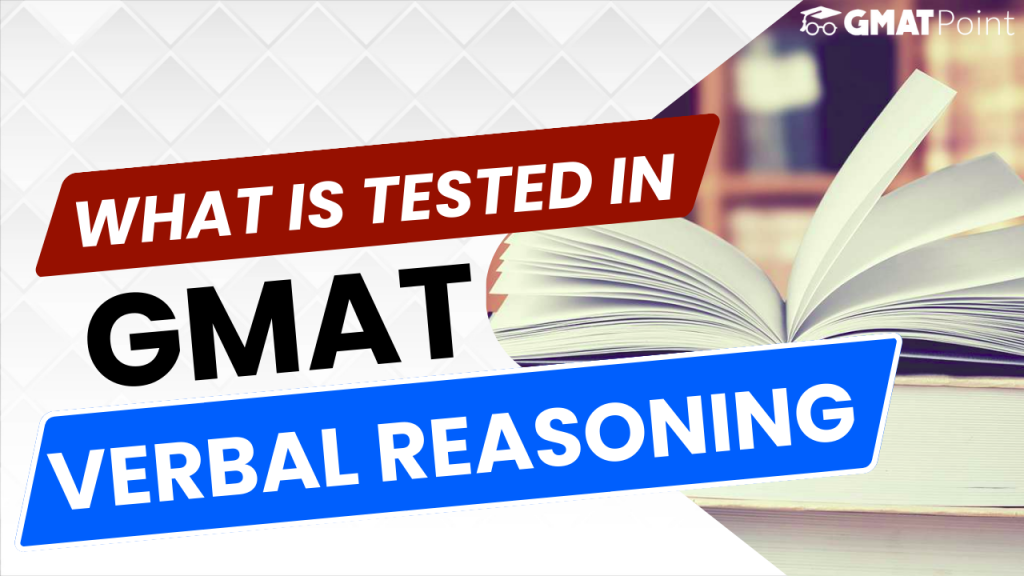GMAT Verbal Section Overview
Is the GMAT verbal section troubling you? Or do you want to know exactly what the top B-Schools across the world look for in a candidate’s Verbal ability? In this article, we will discuss precisely that, and how you can start preparing for this section to ace the GMAT Verbal Reasoning section.
The Verbal Reasoning section of the GMAT is designed to evaluate a test taker’s ability to read and comprehend written material, reason and evaluate arguments in a time-bound environment. The section consists of 36 multiple-choice questions, which must be completed in 65 minutes.
Take Free GMAT 2023 Daily Targets
Subscribe To GMAT Preparation Channel
GMAT Verbal Section Breakdown
This section consists of three types of questions which are shown below. One can also check out the breakdown weightage for each type of question in the below pie chart.

Reading Comprehension
The Reading Comprehension (RC) questions are presented based on a passage of approximately 350 words. An RC passage is given, followed by a set of questions that test the test taker’s understanding of the passage’s content and structure. The passages cover topics from the social sciences, physical or biological sciences, and business-related topics. The passages may be written in a dense or abstract style, making it challenging to understand the content. To succeed in this
section, the test taker must be able to identify and understand the central idea of the passage, recognize the author’s tone, the main purpose of the passage, and identify and interpret the supporting evidence.
Critical Reasoning
The Critical Reasoning (CR) questions present an argument or a part of an argument, followed by a question that tests the test taker’s ability to analyze the argument’s logical structure and to draw conclusions or make inferences based on the information presented. Critical Reasoning questions require the test taker to read critically, identify assumptions and the conclusion, evaluate evidence, and recognize logical fallacies. The test taker must be able to evaluate the reasoning clearly and concisely in a structured manner.
Sentence Correction
The Sentence Correction (SC) questions present a sentence, part of which is underlined, followed by five options for the underlined portion of the sentence. The test taker must choose the option that corrects the sentence’s grammatical error or improves the sentence’s clarity and concision. Sentence Correction questions test your knowledge of standard written English grammar and usage, as well as your ability to recognize stylistic flaws in a sentence.
How To Improve Verbal In GMAT?
- Through all of this, the exam tests your basic understanding of the English language and how quickly you can comprehend and extract an inference out of written material. This is a skill that, although sounds quite easy to some, take some time to master. You need to develop a habit of reading daily to be able to read quickly during the exam. Remember that you would have roughly 2 minutes for each question in this section; to find grammatical flaws or comprehend large paragraphs, you must develop a certain comfort with the English language.
- An excellent way to develop comfort in English is to read good-quality online articles and good English novels. Not only do such articles provide you with good-quality English, but they are also thought-provoking. Reading them will, in turn, improve your critical thinking abilities. When you develop a reading habit, you automatically develop the intuition to sense whether a sentence is grammatically correct. However, to actually find the grammatically correct sentence out of the given options, you must practice many questions.
- You would find similar hurdles in reading comprehension and critical reasoning as well. To start practising more of these questions, head over to GMATPoint, where we provide Free Daily Targets. Here you get to solve 5 questions of Verbal Reasoning and 5 questions of Quantitative Reasoning for free every day, along with video solutions. Hence, this is a perfect tool for you to hone your Verbal Reasoning skills and maintain consistency by practising daily.
- In conclusion, the GMAT Verbal section tests a range of skills and knowledge related to reading, grammar & meaning, and critical thinking. If you keep reading and keep practising, you will improve in these aspects, and you can perform well on the GMAT Verbal section and increase your chances of being accepted into the graduate program of your dreams.
Also Read:
- What Is GMAT? – Everything to know about the test
- How To Prepare For GMAT In 1 Month?
- How To Improve In GMAT Sentence Correction: Tips, Tricks, and Strategies
- 6 Interesting Facts About The GMAT Exam You Should Know
- GMAT preparation for beginners: What to Study and How
- 6 Best Practices for GMAT Preparation: The Ultimate Study Guide
- How To Study For GMAT With Full-time Job?
- Can You Study for GMAT On Your Own? A Step-by-step Approach
- Is GMAT Easy To Crack? What Makes GMAT Challenging
- How to start your GMAT preparation | 5 Tips To Crack GMAT
- Top colleges accepting GMAT scores in India
If you are starting your GMAT preparation from scratch, you should definitely check out the GMATPOINT
